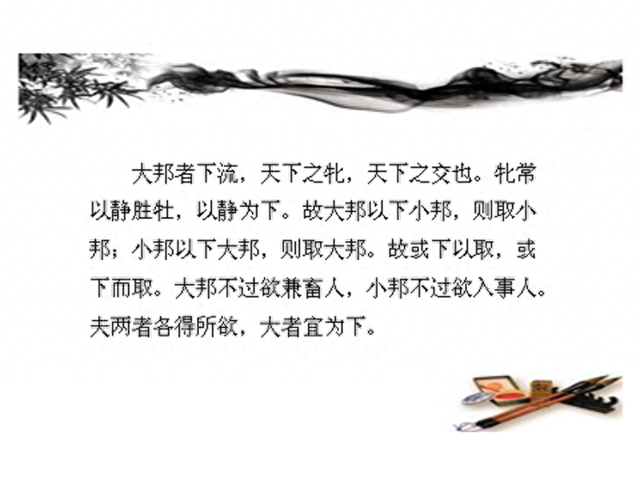第六十一章
大者宜下
原文 英译
英译A Large State Had Better Take a Lower Position
Just like the lowest reaches where all rivers meet,
a big state should play the role of a female.
Female tenderness is often better than male strength by being quiet,
because the former takes the lower position.
Therefore, if a big state is modest and tolerant to a small state,
it can gain the trust and dependence of the small one;
if a small state is modest and tolerant to a big state,
it can be tolerated by the big one.
Therefore, either the big state gains the trust of the small state by being modest,
or the small state is humble to the big state and tolerates it.
A big state should not try to rule a small one too much,
and a small state should not try to obey a big one too much.
Thus, the two sides get what they want respectively,
and the large state should be willing to take the lower position.
说明1. “以静为下”的英译
“以静为下”,何为“静”?何为“下”?许渊冲将“以静为下”译为“laying still by taking a lower position”,“静”选词为“lay still”,“下”的取词为“take a lower postion”,其“大邦以下小邦”、“小邦以下大邦”中的“以下”都采用了“take a lower postion”的相同译法。辜正坤的译法与许渊冲相近,“静”译作“motionlessness”,“下”译作“take the lower position”。Arthur Waley译法与以上两者不同“以静为下”译作“by quiescence gets underneath”。在我们的译文 “以静为下”中,“静”译作“being quiet”,“下”译作“take the lower position”,而“大邦以下小邦”、“小邦以下大邦”中“下”,我们则采取意译,将其译为“be modest and tolerant to”,这样更易于读者明白其意,并且也更符合英语的表达习惯。
2. “大邦不过欲兼畜人”、“小邦不过欲入事人”的英译
基于译者理解视角的不同,“大邦不过欲兼畜人”、“小邦不过欲入事人”的英译的方法各有千秋。
许渊冲将其分别译为“A large state will only rule and protect(大邦不过欲兼畜人)”、“a small state will be ruled and protected(小邦不过欲入事人)”,其中将“不过”理解为“only”,“欲”用情态动词“will”表达。即两者存在统治与被统治、保护与被保护的关系。
辜正坤则将其译作“The large state wants to put the small one (state)under its protection(大邦不过欲兼畜人)”、“The small state wants be shielded by the large one(小邦不过欲入事人)”,其中的“不过”没有专用译词,“欲”用“want”表达。
Arthur Waley的理解和翻译非常有意思,他从人口的就业的角度来理解,译作“What large countries really need is more inhabitants; And what small countries need is some place where their surplus inhabitants can go and get empllymen.”。
我们的译本的最大不同是将“不过欲”理解为“不要过于(not---too much)”,故整句译作“A big state should not try to rule a small one too much, and a small state should not try to obey a big one too much.”。
